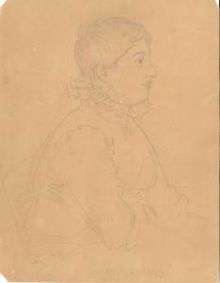Anna Gurney

Anna Gurney (1795–1857) was a British scholar specialising in Old English[1] and a member of the Gurney family.
Biography
Gurney, youngest child of Richard Gurney of Keswick Hall, Norwich, Norfolk, who died 16 July 1811, by his second wife Rachel, second daughter of Osgood Hanbury of Holfield Grange, Essex, was born on 31 December 1795, and when ten months old was attacked with a paralytic affliction which deprived her for ever of the use of her legs. She passed through her busy, active, and happy life without ever having been able to stand or move without mechanical aid.[1]
At an early age she learnt Latin, Greek, Hebrew, and Anglo-Saxon. In 1819 she brought out anonymously, in a limited impression for private circulation, A Literal Translation of the Saxon Chronicle. By a Lady in the Country. This work, which went to a second edition, was commended by James Ingram, in his Saxon Chronicle with Translations, 1823, preface, p. 12.[1]
In 1825, after the death of her mother, she went to reside at Northrepps Cottage, near Cromer, with Miss Sarah Buxton. That lady died in 1839, and Miss Gurney continued to inhabit the cottage for the remainder of her life. While living there she procured at her own expense one of Manby's apparatus for saving the lives of seamen wrecked on dangerous coasts, and in cases of urgency she caused herself to be carried down to the beach, and directed the operations from her chair. Gurney worked with Amelia Opie to create an Anti-Slavery Society in Norwich.[2]
Gurney visitedo Rome, Athens and Argos, and was contemplating a voyage to the Baltic. In 1845 she became an associate of the British Archaeological Association, being the first lady member who joined the association. In the Archæologia, xxxii. 64–8, is a communication from her on The Discovery of a Gold Ornament near Mundesley in Norfolk, and in xxxiv. 440–2 is a paper On the Lost City of Vineta, a submerged Phœnician city.[1]
In her later life she studied Danish, Swedish, and Russian literature. After a short illness she died at the residence of her brother, Hudson Gurney, at Keswick, near Norwich, on 6 June 1857, and was buried in Overstrand Church.[1]
References
- 1 2 3 4 5
 "Gurney, Anna". Dictionary of National Biography. London: Smith, Elder & Co. 1885–1900.
"Gurney, Anna". Dictionary of National Biography. London: Smith, Elder & Co. 1885–1900. - ↑ Women's Anti-Slavery Associations, Spartacus, Retrieved 30 July 2015
- Attribution
![]() This article incorporates text from a publication now in the public domain: "Gurney, Anna". Dictionary of National Biography. London: Smith, Elder & Co. 1885–1900.
This article incorporates text from a publication now in the public domain: "Gurney, Anna". Dictionary of National Biography. London: Smith, Elder & Co. 1885–1900.
|